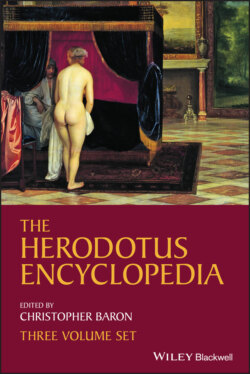Читать книгу The Herodotus Encyclopedia - Группа авторов - Страница 987
BLACK ATHENA
ОглавлениеEMMA BRIDGES
Institute of Classical Studies, University of London
Black Athena is the title of a controversial work in three volumes (published 1987, 1991, and 2006) by historian Martin Bernal (1937–2013), in which the author’s stated political aim was to “lessen European cultural arrogance’”(Bernal 1987, 73) by reasserting the validity of what he called the “Ancient Model” of the origins of ancient Greek civilization.
According to Bernal’s “Ancient Model,” Greek civilization had its roots in Afroasiatic cultures and arose as a result of COLONIZATION around 1500 BCE, when Egyptians and PHOENICIANS introduced their culture to the indigenous population of what later became known as “HELLAS.” Bernal argued that this was the conventional view held by Greeks of the classical and Hellenistic periods, and that it could be seen in the writings of AESCHYLUS, Herodotus, Isocrates, and Plato, and in particular in these authors’ treatment of myths relating to MIGRATION and colonization. He contended that this model had been supplanted in classical scholarship since the late eighteenth century CE by what he called the “Aryan Model,” which he suggested was the product of racist and anti‐Semitic tendencies. This alternative model, Bernal asserted, was based on distortion of the ancient evidence by European scholars and held that Greek culture arose not from the cultures of north Africa and the Levant, but from an invasion by Indo‐European speakers from northern EUROPE who had overwhelmed the indigenous “Aegean” or “pre‐Hellenic” culture. He posited instead a “Revised Ancient Model” which accepted that there was a sound basis to the stories of Egyptian and Phoenician colonization, but which modified some details relating to CHRONOLOGY and linguistic adaptations (Bernal 1987, 2).
While Bernal employed a range of different ancient sources as evidence for his thesis (using archaeological and linguistic sources to corroborate his discussion of the ancient literary texts mentioned above), Herodotus’ Histories was a cornerstone of his argument, and also provided the inspiration for the title of his work. Referring to Herodotus’ detailed description of the goddess ATHENA’s association with LIBYA (4.188–89) and the iconographic connections between Athena and the Egyptian goddess Neith (or Nēit), Bernal asserted that Herodotus thought that the Egyptians and some Libyans were black, writing, “it is the conjunction of Nēit/Athena’s Egypto‐Libyan origins, Herodotos’ awareness of the connection, and his portrayal of the Egyptians as black, that has inspired the title of this series” (Bernal 1987, 53). The first chapter proper of Black Athena Volume I opens with Herodotus’ assertion (6.55), based on the chronicles of earlier writers, that the Egyptians came to the PELOPONNESE and made themselves kings in that part of Greece; Bernal argued (1987, 75, 98–101) that this strongly suggests that in the fifth century BCE it was generally believed that Greece had been colonized by Egyptians. He focused upon Herodotus’ suggestions that PELASGIANS formed the majority of the early population of Greece and the AEGEAN, and that most of them were assimilated by the Hellenes after the invasion of DANAUS (which Herodotus placed around the middle of the second millennium BCE).
Black Athena sparked a heated debate within the academic community, with critics of Bernal’s theory focusing on the notion that we cannot necessarily view MYTH as having a kernel of real “historical truth” and that the myths used by the Greeks themselves were constructs which evolved and differed according to the particular cultural background of the tellers of the myths (see Hall 1992, suggesting that Bernal did not consider the distinction—first drawn by Max Weber—between subjective and objective ETHNICITY, and pointing out too that he failed to take into account the fact that his sources were largely Athenocentric in their bias). In 1996 Mary Lefkowitz, in Not Out of Africa, questioned the Afrocentric interpretation of Greek history favored by Bernal and others, and sought to reassert the importance of discussing historical EVIDENCE rather than presenting historical fictions as absolute TRUTH. Lefkowitz and MacLean Rogers’ 1996 Black Athena Revisited collected a series of essays by scholars discussing key elements of Bernal’s thesis and his methodology. Many agreed that the questions which Bernal’s work raised concerning the relationship between early Greek civilization and the ancient Near East were important ones, but cast doubt upon his conclusions (Lefkowitz and MacLean Rogers 1996, 452–53). There ensued an extended and hostile debate between Bernal and Lefkowitz, conducted publicly through the pages of the New York Review of Books and London Review of Books. Bernal also produced a direct response to the criticisms set out in Black Athena Revisited in a collection of essays entitled Black Athena Writes Back (2001).
SEE ALSO: Archaeology; Arians; Dorians; Egypt; Historical Method; Orientalism; Scholarship on Herodotus, 1750–1945; Scholarship on Herodotus, 1945–2018
